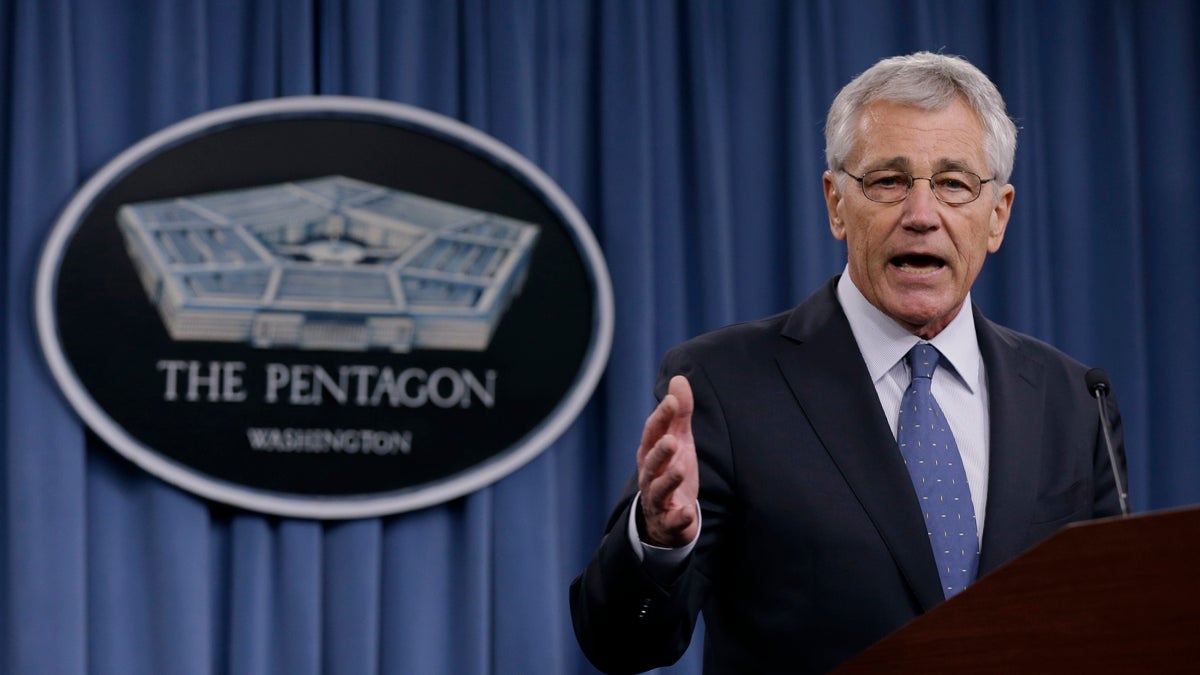History shows that U.S. military cuts will have grave consequences

Defense Secretary Chuck Hagel briefs reporters at the Pentagon, Monday, Feb. 24, 2014, where he recommended shrinking the Army to its smallest size since the buildup to U.S. involvement in World War II in an effort to balance postwar defense needs with budget realities. (AP Photo/Carolyn Kaster)
The president’s proposed defense budget and the general attitude that we should balance the budget on the back of national security is a recipe for disaster. It puts the United States on the path of geopolitical irrelevance. Such irrelevance encourages unsavory actors to assume leadership.
Last week, Secretary of Defense Chuck Hagel announced massive cuts in the president’s upcoming defense budget. The cuts are so large that the U.S. Army will be reduced to pre-WWII levels of 420,000 soldiers from current levels of 522,000. Additionally, pay and benefits will be cut. The Air Force’s A-10 Warthog would be eliminated.
The president’s proposed defense budget and the general attitude that we should balance the budget on the back of national security is a recipe for disaster. It puts the United States on the path of geopolitical irrelevance. Such irrelevance encourages unsavory actors to assume leadership.
Some who agree with such cuts give into the dangerous impulse of isolationism. They believe that ignoring problems abroad keeps them from ending up here in the United States. Others let their idealism defy logic by thinking that maintaining a large, well-funded U.S. military invites aggression. They think America’s enemies will respond to lofty rhetoric instead.
Important lessons from recent history
I think the president as well as those who agree with the defense proposals should learn from modern history. There, one can find numerous examples of what happens when a nation does not take national security seriously, military readiness is ignored or the dangers in the world are under-estimated.
In 1936 Hitler remilitarized the Rhineland in violation of the World War I settlement. Despite Winston Churchill’s warnings, Prime Minister Stanley Baldwin, in words that we might hear today, stated that Britain did not have the resources to enforce treaty obligations. By 1939, the world was at war.
The first actions of the Korean War also demonstrated that poor preparation leads to disaster. When North Korea invaded the South in 1950, Task Force Smith was sent to slow the North’s advance while the rest of U.S. forces were put in position. However, the unit proved under-equipped, under-manned and inexperienced. Not only defeated by the experienced North Koreans, the unit suffered most of its casualties during a confused withdrawal.
In 1973, Israel learned the lesson of assuming attacks were not likely. Despite Egyptian military exercises,saber-rattling rhetoric by Arab leaders and warnings from eleven sources, Israel did not act. An invasion of Israel occurred and the costly Yom Kippur War was the result.
In 1991, the United States proved able to defeat the Iraqi military, world’s fourth largest at the time, within weeks and drive them from Kuwait. The U.S military at the time was the result of a decade of military preparation. Then-Secretary of Defense, Dick Cheney, actually called up former President Ronald Reagan after the war to thank the former President for the military build-up of the 1980s. However, complacency set in a few years later as the military was reduced by the Clinton administration. The impact was felt when troops including the national guard and reserve were subjected to multiple deployments in Iraq and Afghanistan and thus, straining the military.
History repeating
Today’s world is no less dangerous. Russia has occupied Ukraine. Venezuela is in chaos. China is saber-rattling in the South China Sea. Iran and Syria cast a shadow in the Middle East. Radical Islamic groups are rampant in Africa. When the U.S. does not take foreign policy seriously, when it undermines military readiness, when it fails to lead, the country is threatened and the world suffers.
The President must realize the consequences of the actions he is taking. He must ignore his base and re-commit himself to a strong national defense and balance the budget with entitlement reforms. Ultimately, he must choose good policy over good politics.
WHYY is your source for fact-based, in-depth journalism and information. As a nonprofit organization, we rely on financial support from readers like you. Please give today.

